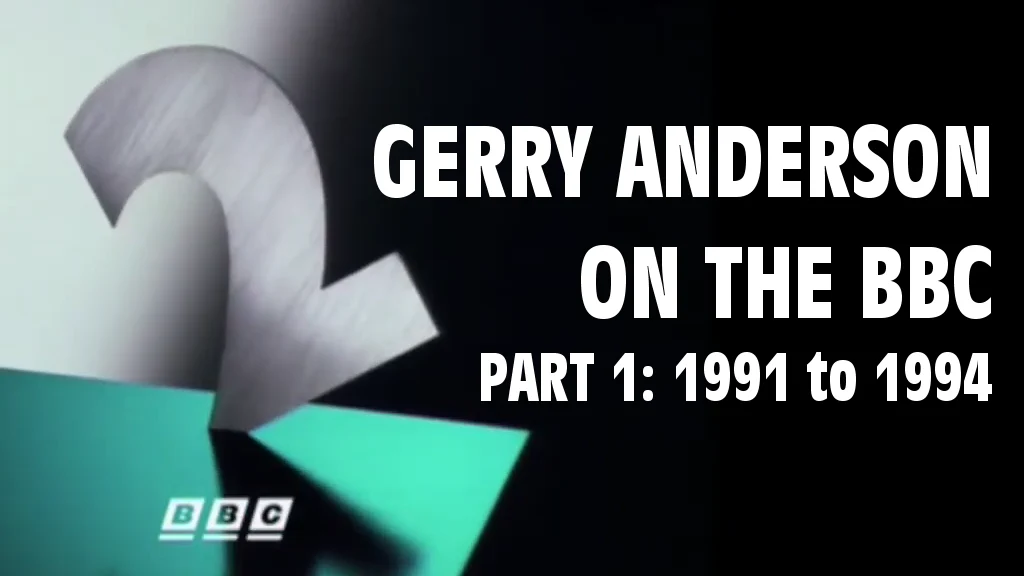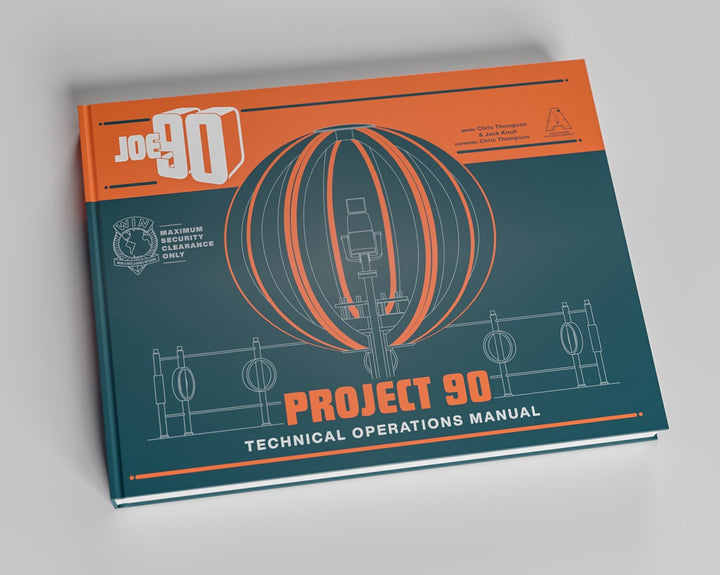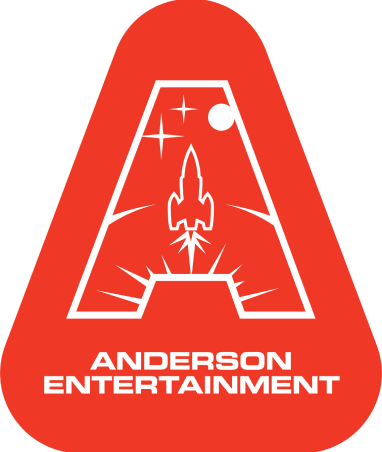Gerry Anderson on the BBC (part 1) - 1991 to 1994

Although Thunderbirds had premiered on British television back in 1965 and would be repeated several times over the next two decades, the fragmented regional makeup of the British television landscape of the time meant that different regions would see different episodes airing at different times – with some regions receiving more broadcasts than others. When the BBC purchased the rights to repeat Thunderbirds in 1991, the series was to finally receive a network premiere; each episode airing across all the regions of the country simultaneously for the very first time. Although the series was already a proven hit it was by now more than twenty five years old, so the BBC certainly weren’t to know this repeat run would kick off a new of Thunderbirds mania that would see many other Anderson shows (new and old) also finally getting their network premieres and multiple subsequent repeat runs that would continue across the next fifteen years...
(Please note that for this four-part history of Anderson repeats on the BBC kicked off by Thunderbirds in 1991, we will only be looking at the broadcasts of the actual episodes rather than other shows that featured the inclusion of Anderson-related content, be it an interview, a behind-the-scenes set visit or even just clips - there are far too many of those to cover!)
https://www.youtube.com/watch?v=y-OJous6pLU
The BBC had high hopes for Thunderbirds considering its success back in the 1960s, and even promoted their purchase of the series on the national news. However, nobody at the BBC was prepared for Trapped in the Sky to attract an audience of seven million viewers when the series blasted off on BBC 2 on Friday September 20th at 6pm. Subsequent weeks proved that public interest in the series was not a random fluke, with consistently impressive ratings for the rest of the year. Following 30 Minutes after Noon on December 13th, Give or Take a Million (the Thunderbirds Christmas episode) was pulled forward from its traditional spot at the end of the series to air nearer Christmas on December 20th.
https://www.youtube.com/watch?v=pciwEAGhd_8
While not the audience-grabbing smash hit that Thunderbirds had been, Stingray still proved to be extremely popular with fans new and old, with the first episode attracting 3.36 million viewers and subsequent instalments pulling in between two and three million viewers on average. The series took a break for Christmas following Secret of the Giant Oyster on December 18th – but unlike Thunderbirds, the show’s Christmas episode would not be brought forward in the run to air nearer the holiday itself.
https://www.youtube.com/watch?v=zLNcbOmmyA4
Looking for new ways to capitalise on the continuing popularity of Thunderbirds while also educating its audience, BBC 2 made the unconventional decision to take the episode The Man from MI.5, replace the English soundtrack with the original French dub, cut it into ten five-minute chunks, and air each ‘episode’ twice weekly as part of their early afternoon weekday schools programming from September 15th to November 26th.
From October 4th, the original uncut Thunderbirds returned and could now be found occupying a 12-midday slot on Sunday lunchtimes, attracting similar numbers of viewers to the Stingray broadcasts. The series ran more or less in the ITC Recommended broadcast order, once again with the exception of Give or Take a Million being pulled forward in the run to air nearer Christmas on December 20th for the second year in a row. Day of Disaster followed on the 27th.
https://www.youtube.com/watch?v=WiQCN8vJQiE
Captain Scarlet and the Mysterons premiered on BBC 2 on Friday October 1st 1993 at 6pm, with the first episode attracting an audience of 4.17 million viewers and subsequent episodes performing consistently well. The return of the series was once again accompanied by a flurry of merchandising, and the result was another successful revival of a nearly thirty-year-old series. The episodes were however edited to remove the appearance of the Spectrum logo and cut to black during the mid-episode advert break cliffhanger, with the two halves of each episode now running seamlessly into each other. The series took a break for Christmas after Shadow of Fear on December 17th, while Stingray finally concluded its first BBC run two days later on the 19th.
Thunderbirds in French was also reshown during 1993, from September 21st to December 2nd.
https://www.youtube.com/watch?v=D9DNQq8cm8o
During the final weeks of Captain Scarlet’s first run on BBC 2 another Anderson series had arrived on BBC 1, as Joe 90 premiered at 7.45am on Saturday April 23rd. In keeping with the public misconception of Joe 90 as a more child friendly Supermarionation series, the BBC chose to air the series as part of its children’s programming block known as CBBC, hosted by the likes of Chris Jarvis, Zoe Ball, Toby Anstis, and Philippa Forester. In order to fit that timeslot, cuts were made to many episodes to limit the level of violence and gunplay; cuts that had never been needed to be made to the early evening broadcasts of Thunderbirds and co on BBC 2. In addition, the show’s time-lapse zooms at the advert break points were often trimmed, episodes which featured a pre-titles sequence were re-edited to move it to after the opening titles instead, and the series was broadcast with a completely new Joe 90 logo (seen here);
https://www.youtube.com/watch?v=yonIli-biB4
While the BBC 2 broadcasts of Thunderbirds had enjoyed average audience viewing figures of between four and seven million, the Saturday morning screenings of Joe 90 struggled to reach even a quarter of a million – scuppering Vivid Imaginations’ hopes for another smash hit rerun that would guarantee sales figures for their Joe 90 merchandise comparable to that of their highly successful Captain Scarlet range.
https://www.youtube.com/watch?v=-9qlk51ylVU
While Joe was failing to make an impact on Saturday mornings on BBC 1, BBC 2 was preparing a night of programming dedicated to Lord Lew Grade and ATV. Broadcast on Saturday August 27th, this five hour ‘ATV Night’ prompted BBC 1 to join in by scheduling accompanying weeknight episodes of four ITC action shows beginning on Monday August 29th, which included two live action Anderson series; Space:1999 (War Games) on August 30th, and The Protectors (Triple Cross) on Thursday September 1st. War Games would be shown again during 1998 as part of BBC 2’s full repeat run of Space:1999, but Triple Cross was the only episode of The Protectors to air on any of their channels.
https://www.youtube.com/watch?v=_w0DsFJwZDY
Captain Scarlet returned to BBC 2 for a second Friday evening run commencing on September 9th with the previously unscreened The Inquisition and then proceeding through the entire series again from The Mysterons the following week. Meanwhile, the BBC 1 Saturday morning reruns of Joe 90 were halted after Child of the Sun God on September 17th, resuming on December 27th with the first of the eight remaining episodes See You Down There and continuing each weekday morning at 10.30am.
Thunderbirds in French was shown again, from September 20th to November 22nd, while September 22nd saw the start of another run of Thunderbirds in Hindi which concluded on December 1st.
December 19th saw the start of the shortest Thunderbirds repeat run yet, as children’s schedule filler in the week leading up to Christmas; daily 8.15am BBC 2 weekday repeats of Trapped in the Sky, Pit of Peril, City of Fire, Sun Probe, then temporarily ending with Give or Take a Million on December 23rd. This run would continue into 1995 - but not very far!
1991
1992
Following the incredible success of the Friday night Thunderbirds repeats, which resumed on January 3rd with Desperate Intruder and concluded on May 15th with Ricochet, BBC 2 now began airing Stingray from Friday September 11th 1992 at 6pm, followed by repeats of The Man from U.N.C.L.E. (beginning with The Ultimate Computer Affair) at 6.25.1993
The Sunday lunchtime Thunderbirds repeats resumed with 30 Minutes after Noon on January 3rd, ran through to The Cham-Cham on April 4th – and then vanished! Six episodes would remain unshown from this run: Security Hazard, Atlantic Inferno, Path of Destruction, Alias Mr. Hackenbacker, Lord Parker’s ‘Oliday, and Ricochet. Apparently pleased with the success of Thunderbirds in French, the BBC unleashed a sequel; Thunderbirds in Hindi aired from January 12th to March 25th, following the same template as the French redub but this time using the episode The Perils of Penelope. Stingray repeats continued into 1993 starting with Raptures of the Deep on January 8th, but following the broadcast of Titan Goes Pop on April 9th the series took a six month break and eventually resumed with weekly Sunday lunchtime broadcasts of the remaining episodes on October 3rd – two days after another Supermarionation series arrived on the channel.1994
Captain Scarlet continued into 1994 (resuming with The Trap on January 7th) but as with Stingray BBC 2 chose not to air all the episodes during its first run. This time however, only one story would be held back; the flashback episode The Inquisition, with the series instead ending with Attack on Cloudbase on May 27th 1994. Meanwhile, Thunderbirds in Hindi was shown again from January 11th until March 24th.
TO BE CONTINUED...




![Thunderbirds Comic Anthology Volume One [HARDCOVER] - The Gerry Anderson Store](http://gerryanderson.com/cdn/shop/files/thunderbirds-comic-anthology-volume-one-hardcover-8030771.jpg?v=1751089031&width=720)
![All Sections Alpha: The Making of Space: 1999 [HARDCOVER] - The Gerry Anderson Store](http://gerryanderson.com/cdn/shop/files/all-sections-alpha-the-making-of-space-1999-hardcover-7498116.png?v=1757766647&width=720)

![Stingray Comic Anthology Volume Two – Battle Lines [HARDCOVER] - The Gerry Anderson Store](http://gerryanderson.com/cdn/shop/files/stingray-comic-anthology-volume-two-battle-lines-hardcover-107681.jpg?v=1738856151&width=720)
![Stingray W.A.S.P. Technical Operations Manual Standard Edition [HARDCOVER] - The Gerry Anderson Store](http://gerryanderson.com/cdn/shop/files/stingray-wasp-technical-operations-manual-standard-edition-hardcover-112278.jpg?v=1749664163&width=720)
![Stingray WASP Technical Operations Manual Special Limited Edition [HARDCOVER BOOK] - The Gerry Anderson Store](http://gerryanderson.com/cdn/shop/files/stingray-wasp-technical-operations-manual-special-limited-edition-hardcover-book-991914.jpg?v=1749657538&width=720)
![Stingray: The Titanican Stratagem – Signed Limited Edition [HARDCOVER NOVEL] - The Gerry Anderson Store](http://gerryanderson.com/cdn/shop/files/stingray-the-titanican-stratagem-signed-limited-edition-hardcover-novel-129251.jpg?v=1740558711&width=720)








1 comment
Thanks for this! I have been wondering why Thunderbirds had such an impact on me in the early 90s so it’s very interesting to read about when and why it returned to our screens.